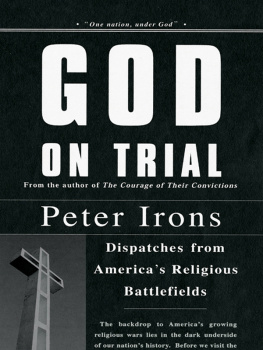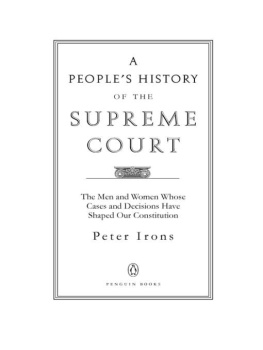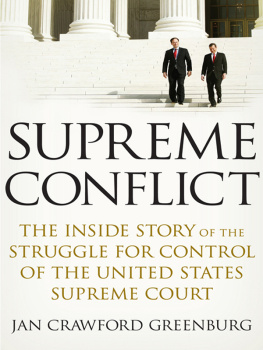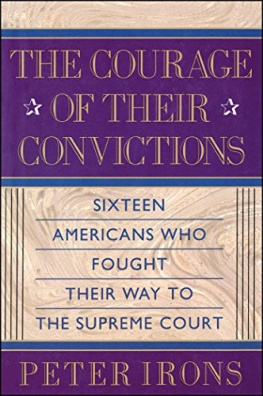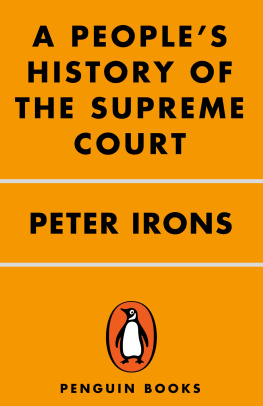The Courage of Their Convictions: Sixteen Americans Who Fought Their Way to the Supreme Court
Brennan vs. Rehnquist: The Battle for the Constitution
GOD ON TRIAL
Dispatches from Americas
Religious Battlefields
PETER IRONS
VIKING

VIKING
Published by the Penguin Group
Penguin Group (USA) Inc., 375 Hudson Street, New York, New York 10014, U.S.A.
Penguin Group (Canada), 90 Eglinton Avenue East, Suite 700, Toronto, Ontario, Canada M4P 2Y3 (a division of Pearson Penguin Canada Inc.) Penguin Books Ltd, 80 Strand, London WC2R 0RL, England Penguin Ireland, 25 St. Stephens Green, Dublin 2, Ireland (a division of Penguin Books Ltd) Penguin Books Australia Ltd, 250 Camberwell Road, Camberwell, Victoria 3124, Australia (a division of Pearson Australia Group Pty Ltd) Penguin Books India Pvt Ltd, 11 Community Centre, Panchsheel Park, New Delhi110 017, India Penguin Group (NZ), 67 Apollo Drive, Mairangi Bay, Auckland 1311, New Zealand (a division of Pearson New Zealand Ltd) Penguin Books (South Africa) (Pty) Ltd, 24 Sturdee Avenue, Rosebank, Johannesburg 2196, South Africa
Penguin Books Ltd, Registered Offices: 80 Strand, London WC2R 0RL, England
First published in 2007 by Viking Penguin, a member of Penguin Group (USA) Inc.
Copyright Peter Irons, 2007
All rights reserved
LIBRARY OF CONGRESS CATALOGING-IN-PUBLICATION DATA
Irons, Peter H., 1940
God on trial: dispatches from Americas religious battlefields / Peter Irons.
p. cm.
Includes bibiographical references and index.
ISBN: 9781101202401
1. Freedom of religionUnited States. 2. Church and stateUnited States. I. Title.
KF4783.I76 2007
342.7308'52dc22 2006052815
Without limiting the rights under copyright reserved above, no part of this publication may be reproduced, stored in or introduced into a retrieval system, or transmitted, in any form or by any means (electronic, mechanical, photocopying, recording, or otherwise), without the prior written permission of both the copyright owner and the above publisher of this book.
The scanning, uploading, and distribution of this book via the Internet or via any other means without the permission of the publisher is illegal and punishable by law. Please purchase only authorized electronic editions and do not participate in or encourage electronic piracy of copyrightable materials. Your support of the authors rights is appreciated.
Version_2
For my friends in the United Methodist Church of Greenville, California, who really believe in Open Hearts, Open Minds, Open Doors
And to the memory of Phil Paulson, who never wavered in his indomitable defense of church-state separation
CONTENTS
PREFACE
God on Trial tells the stories of recent conflicts over religion in six American communities: towns and cities that have become battlefields in Americas growing religious wars. They are spread across the country, from Pennsylvania to California, and range in size from a rural town of barely a thousand people to the nations seventh-largest city. Each conflict began with a decision by elected officialsschool-board members, city councilors, county executives, or state legislatorsto place a religious symbol on public property or to adopt a religious practice in public schools. Some of these symbols and practices went unchallenged for years, even decades, while others prompted an immediate objection by dissenting community residents. Each local conflict wound up in federal courtrooms, requiring judgesfrom the trial level to the Supreme Courts chamberto interpret and apply the first clause of the First Amendment to the Constitution: Congress shall make no law respecting an establishment of religion. The outcomes of these cases differed widely, reflecting long-standing judicial discord over the original intent of the clauses framers in 1789 and its current meaning, more than two centuries later. Similar cases have already divided local communities, and will soon be decided by judges and justices whose earlier rulings in Establishment Clause cases remain open for either reversal or reaffirmation.
The seeds of this book were planted some thirty years ago by a four-word sentence in a Supreme Court opinion that I read as a law student: We live by symbols. Justice Oliver Wendell Holmes, who wrote these words, had in mind symbols that have long rallied their followers to heroic deeds, even to sacrifice their lives in wars to protect the values those symbols embody. One such symbol is the American flag, the defense of which against the Confederate insurrection in the Civil War spurred Holmes to enlist in the Union Army, in whose service he was twice gravely wounded in battle. An equally powerful symbol for many Americans is the Christian cross, often linked to the flag in a merger of religious and patriotic zeal. The two tablets of the Ten Commandments symbolize for both Jews and Christians the moral foundation of Gods rules for belief and behavior. Symbolic meaning can be expressed in words as well as objects. The first chapter of Genesis, read literally by many Christians, symbolizes their belief that God created all of Earths living creatures, including humankind, in just six days. And spoken prayer at public events, from the first meeting of Congress in 1789 to the most recent presidential inauguration, has symbolized the dual commitment of elected officials to God and to the Constitution whose commands they swear to uphold.
Public-opinion polls going back more than four decades show that a strong majority of Americans supports the public display of religious symbols, prayer in public schools, and the teaching of creationism in high-school biology classes. But a minoritysometimes just one person in a communityobjects to such displays and practices. Many dissentersand we cannot know how manysimply hold their tongues and remain silent, fearful of provoking the hostility of their friends and neighbors. Others, however, voice their objections at school-board meetings, in city-council sessions, or in letters to their local papers. An even smaller number take the step of filing lawsuits, often with the aid of lawyers representing organizations committed to the separation of church and state, suits that are frequently opposed by lawyers from well-funded Religious Right groups. Only a tiny number of these suits reach the Supreme Court, but the decisions in such cases have ramifications far beyond the towns and cities in which they began.
Over the past three decades, both as a practicing lawyer and a constitutional-law professor, I have tracked hundreds of Supreme Court cases, and have written about dozens of them in several books, including The Courage of Their Convictions , which recounted sixteen casesdecided between 1940 and 1986that raised issues of race, religion, protest, and privacy. For that book, I visited the communities in which the cases began, and interviewed the people who initiated legal challenges that resulted in landmark Supreme Court decisions. In a later book, Jim Crows Children: The Broken Promise of the Brown Decision, I also visited the five communitiesin Kansas, Delaware, Washington, D.C., Virginia, and South Carolinafrom which challenges to school segregation all reached the Supreme Court and were jointly decided in 1954 in that historic decision. In both books, I recorded the first-person stories of people who were involved in those cases, recalling their experiences in words that expressed the range of emotions from pain to exultation. These stories, I felt, added human faces and voices to the dry words of judicial opinions.

